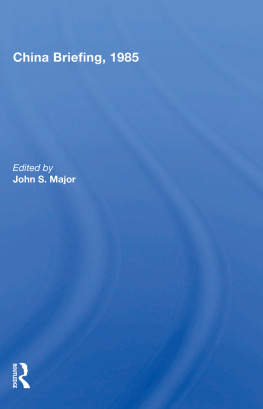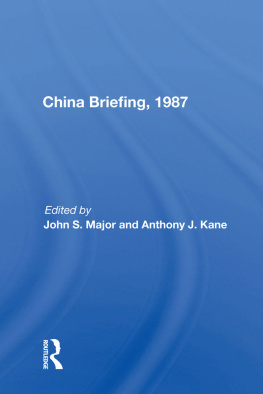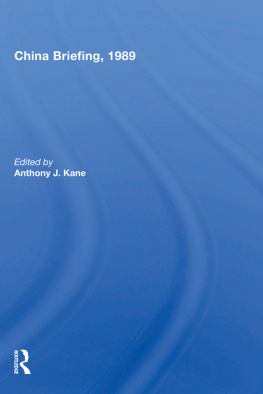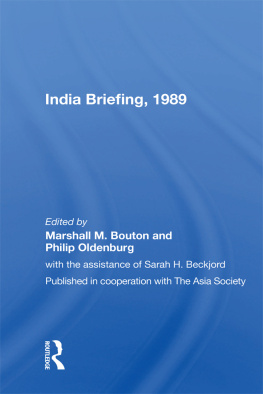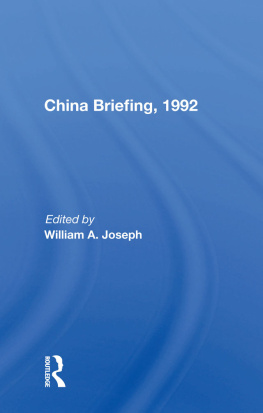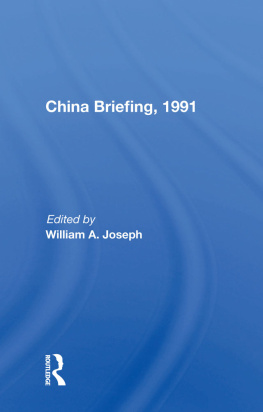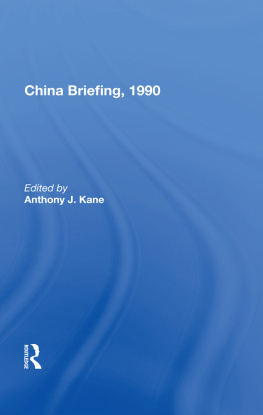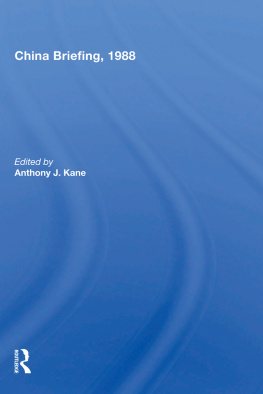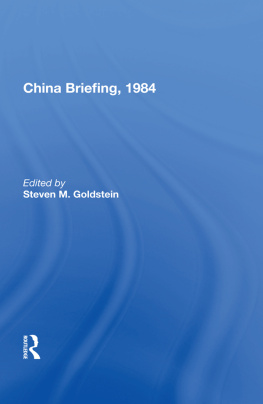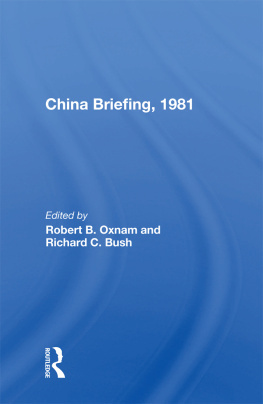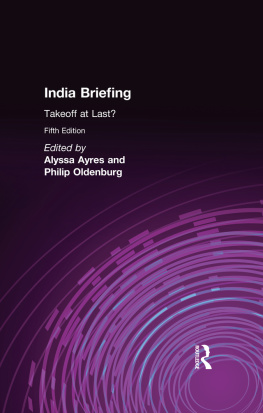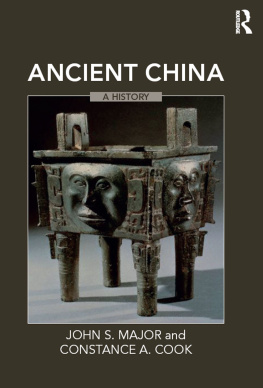China Briefing, 1985
Also of Interest
China Briefing, 1984, edited by Steven M. Goldstein
C hina Briefing, 1982, edited by Richard C. Bush
China Briefing, 1981, edited by Robert B. Oxnam and Richard C. Bush
China Briefing, 1980, edited by Robert B. Oxnam and Richard C. Bush
China Geographer, No. 12: The Environment, edited by Clifton W. Pannell and Christopher L. Salter
Moderodernizing China: Post-Mao Reform and Developme nt, edited by A. Doak Barnett and Ralph N. Clough
The Making of Foreign Policy in China: Structure and Process, A. Doak Barnett
The Government and Politics of the PRC: A Time of Transition, Jrgen Domes
China Through the Ages, Franz Michael, with an Introduction by Robert Scalapino
Power and Policy in the PRC, edited by Yu-ming Shaw
Mainland China: Politics, Economics, and Reform, edited by Yu-ming Shaw
Six Chapters of Life in a Cadre School: Memoirs from China's Cultural Revolution, Yang Chiang, translated and annotated by Djang Chu
Available in hardcover and paperback.
China Briefing, 1985
edited by
John S. Major
Published in cooperation with the China Council of The Asia Society
First published 1986 by Westview Press
Published 2018 by Routledge
52 Vanderbilt Avenue, New York, NY 10017
2 Park Square, Milton Park, Abingdon, Oxon OX14 4RN
Routledge is an imprint of the Taylor & Francis Group, an informa business
Copyright 1986 by The Asia Society
All rights reserved. No part of this book may be reprinted or reproduced or utilised in any form or by any electronic, mechanical, or other means, now known or hereafter invented, including photocopying and recording, or in any information storage or retrieval system, without permission in writing from the publishers.
Notice:
Product or corporate names may be trademarks or registered trademarks, and are used only for identification and explanation without intent to infringe.
Library of Congress ISSN: 0740-8005
ISBN 13: 978-0-367-00651-8 (hbk)
The China Council of The Asia Society is a non-profit, non-partisan educational organization. In keeping with its mission of providing accurate and impartial information on China and U.S.-China relations to the American public, it has in every year but one since 1980 published an annual China Briefing. It is a pleasure to present China Briefing, 1985 to the large and growing number of persons in the United States and overseas who wish to deepen their understanding of contemporary China.
As with China Briefing, 1984, all of the essays in this volume were specially commissioned and have not been previously published. Although each volume of the China Briefing series is intended to stand on its own as a review of the year in question, it is also our hope that the volumes taken together will serve as a cumulative account of events in China over a period of years marked by rapid and exciting changes. Some topicsfor example, politics and international relationsare dealt with in these volumes year after year; others, such as culture and education, appear less frequently. Thus the general approach of Merle Goldman's article on culture in China Briefing, 1984 remains valid in the current year; Peter Seybolt's essay on education in this volume provides a review of salient events in the past few years as well as detailed information for 1985. This year, for the first time since 1982, a chapter is devoted exclusively to Taiwan.
I wish to express my appreciation to all of the authors for producing their chapters with both the necessary speed and efficiency and the hoped-for high quality. Harry Harding's incisive comments as manuscript reader made my editorial task a light one. Corey McDonnell, the China Council's program assistant, handled the manuscript preparation with her customary cheerfulness and efficiency, and in addition prepared the chronology that appears at the end of this volume. Our typists, Mike Franks and Lorri Kaye, were models of coolness and accuracy under pressure. Finally, Susan McEachern, acquisitions editor at Westview Press, was a delight to work with and has my deepest thanks for her patience and cooperation.
John S. Major

Domestic Politics
David Bachman
If reform dominated the news in Chinese domestic politics in 1984, the biggest story to emerge in Chinese politics in 1985 was the discovery of the limits of reform. This is not to say that reform is dead in China, but that throughout 1985, especially in the second half of the year, a diffuse but very broad segment of the Chinese polity made its opposition to elements of the reform program clear. Students, cadres, urban dwellers, national minorities, and others all expressed some degree of dissatisfaction with aspects of the reform program. The views of these groups, the unintended negative consequences of the reforms themselves, the pervasive corruption found in the Chinese Communist Party (CCP), and the failure of official ideology to guide and inspire the Party and the Chinese people, left Deng Xiaoping and his allies with the need to rethink their strategy and tactics fundamentally.
The reformers did advance the transformation of the Chinese economic system during 1985 and appear to have achieved a number of important goals that seemed to strengthen their political position. In the first half of 1985, major programmatic reforms of the science and technology and educational systems were launched. Prices for many agricultural products were allowed to reflect supply and demand. The rural reforms were further consolidated. A major shake-up of the military was undertaken. Personnel changes and policy decisions made at the National Party Conference in September further aided the reformers' cause. While there may have been opposition to these developments, it did not hinder the formulation and at least partial implementation of these measures.
However, in the second half of 1985, the Dengist revolution from above in the name of reform bumped up against "the social limits of politically induced change."and his allies. But when coupled with the revelation of wide-spread corruption in the Party and the government, it presented China's top reformers with a basic and not easily resolved problem by the end of the year. In the short-run (and perhaps longer), some of the key elements of the reformers' constituency had serious doubts about the reform program. Moreover, by the end of the year, it was an open question whether the Party had become so corrupt that it was incapable of pushing through further initiatives. To rephrase the dilemma facing Deng, Hu Yaobang, Zhao Ziyang, and other reformers, they had to continue to rely on an organizational weapon that may no longer be a reliable instrument in carrying out the reforms in the face of mounting opposition from society. Whether the leadership can minimize social discontent while reinvigorating the Party and other major bureaucratic organizations is the crucial issue as China enters the Seventh Five Year Plan (1986-1990).







